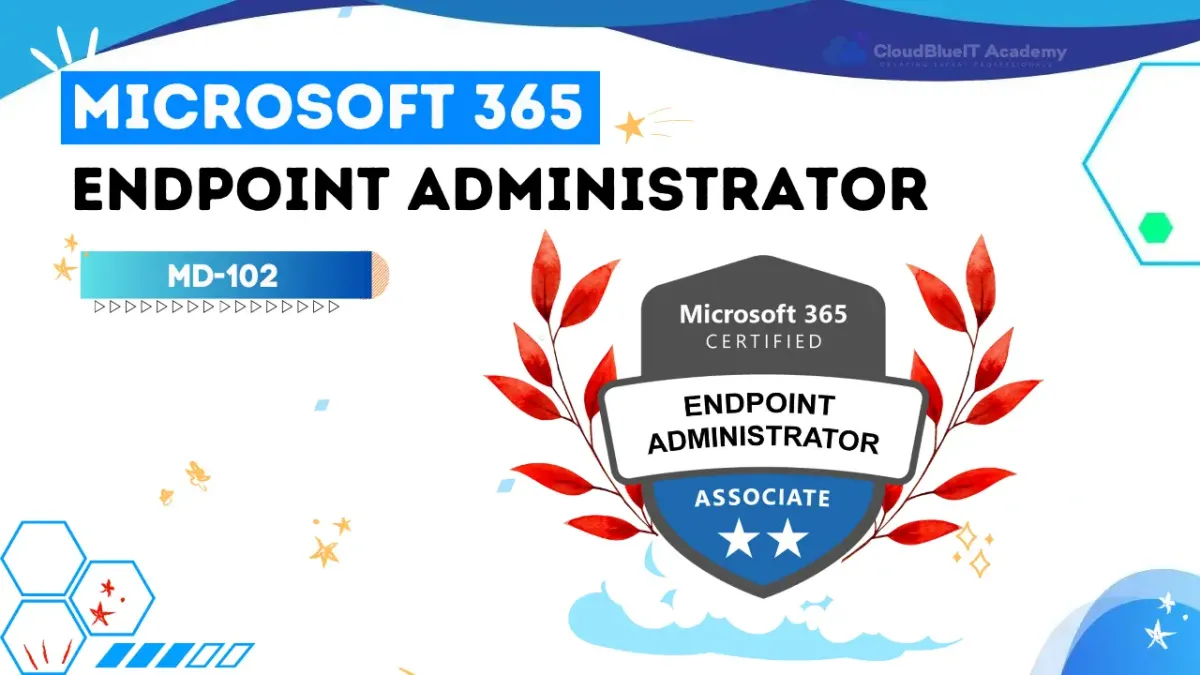Microsoft 365 Endpoint (Intune) Administrator MD-102

About Course
In today’s digital landscape, effective management of endpoint devices is crucial for businesses of all sizes. Microsoft 365 Endpoint Administrator (MD-102) plays a vital role in this domain, offering a comprehensive set of tools and features to streamline device management, enhance security, and ensure efficient operations. This article will delve into the various aspects of Microsoft 365 Endpoint Administrator (MD-102) and its significance in the modern workplace.
Overview of Microsoft 365 Endpoint Administrator (MD-102)
Microsoft 365 Endpoint Administrator (MD-102) is an advanced solution designed to simplify and optimize the management of endpoint devices within an organization. It enables IT administrators to efficiently oversee a wide range of devices, including desktop computers, laptops, tablets, and mobile phones, running on various operating systems such as Windows, macOS, iOS, and Android.
-
Key Features of Microsoft 365 Endpoint Administrator (MD-102)
Device Deployment : ( Windows, Mac, iOS, Android, Linux )
Implementing solutions for efficient deployment and management of endpoints on various operating systems, platforms, and device types.
Centralized Device Management: With Microsoft 365 Endpoint Administrator (MD-102), administrators can manage all devices from a single unified console, reducing complexity and saving time
Application Deployment and Updates: The platform facilitates seamless deployment and updates of applications across devices, ensuring that all users have access to the latest software versions and security patches.
Security and Compliance: Microsoft 365 Endpoint Administrator (MD-102) offers robust security measures to safeguard sensitive data and protect against cyber threats. It provides features like conditional access, data loss prevention, and threat management to enhance endpoint security.
Policy Configuration: Administrators can create and enforce policies that govern device settings, access privileges, and data protection protocols, ensuring consistency and compliance across the organization.
The Role of a Microsoft 365 Endpoint Administrator
A Microsoft 365 Endpoint Administrator holds a crucial position within an organization’s IT department. Their responsibilities include:
Implementing device management strategies and best practices.
Configuring and managing security policies for endpoint devices.
Monitoring and troubleshooting device-related issues.
Collaborating with other IT teams to ensure seamless integration and functionality.
Topics Covered :
Module 1: Overview Endpoint (Intune) Managemen
- Overview of Endpoint Management (Intune)
- Enterprise Desktop Environment
- Windows editions and installation processes
Module 2: Setup Intune (Endpoint Manager) and Entra ID Services
- Setup Intune for Tenant
- Device Enrollment settings and Restrictions
- Settings Entra ID Identities, Devices and Groups
- Manage Entra ID Roles
Module 3: Enroll Windows Device to Intune and Entra ID
- Overview of Device join types in Entra ID
- Register Devices and Join windows devices to Microsoft Entra ID
- Implementing subscription-based activation
- Implement Intune Connector for Active Directory
- Implement Windows Devices with AD and Entra ID using Hybrid Join
Module 4: Deploy Windows Devices using Autopilot
- Overview of Windows Autopilot
- Configure Autopilot for modern deployment
- Devices registration for Autopilot
- Deploy devices using Autopilot Deployment profiles
- Troubleshooting an Autopilot Deployment
Module 5: Android and Apple Devices Enrolment
- Setup Android Devices Enrolment
- Setup Apple Devices Enrolment
- Configure Deployment profiles for Android and Apple Devices
Module 6: Manage Devices setting and configurations using Intune
- Manage Devices settings and bulk actions
- Implement Device configuration profiles
- Manage Membership of local groups on Windows Devices
- Implement and Manage Local Administrator Passwords Solution (LAPS)
Module 7: Application management in Intune
- Deploy Applications using Intune
- Deploy Microsoft 365 Apps, Line of Business, Store Apps and Win32 Apps
- Deploy Apps from platform-specific (Android and iOS) app stores using Intune
- Managing Apps Deployment and settings
- Implement App protection policies
Module 8: Device updates management in Intune
- Manage Device updates by using Intune
- Windows updates using autopatch
Module 9: Manage Endpoint Security
- Integrate Intune with Microsoft Defender for Endpoint
- Endpoint security with antivirus, encryption, firewall, ASR and EDR
- Manage Microsoft Defender in Windows Client
- Manage Microsoft Defender for Cloud Apps
Module 10: Manage compliance, monitor and Reports
- Implement device compliance
- Conditional access policy
- Monitor Devices and Applications in Intune
- Endpoint analytics and Adoption Score
Frequently Asked Questions
Q: What are the prerequisites to become a Microsoft 365 Endpoint Administrator?
To become a Microsoft 365 Endpoint Administrator, one should have a solid understanding of Microsoft 365 suite, endpoint management concepts, and security fundamentals. Relevant certifications, such as MD-101 and MD-100, can also enhance your credentials.
Q: How does Microsoft 365 Endpoint Administrator improve security?
Microsoft 365 Endpoint Administrator enhances security by implementing robust features such as multi-factor authentication, conditional access, and encryption. It enables administrators to enforce security policies, detect and respond to threats, and protect sensitive data across all managed devices.
Q: Can Microsoft 365 Endpoint Administrator manage devices running on different operating systems?
Yes, Microsoft 365 Endpoint Administrator supports a wide range of operating systems, including Windows, macOS, iOS, and Android. This flexibility allows organizations to manage devices with diverse user preferences and requirements effectively.
Course By

Narayana B S L
Target Audience
Audience : Beginner to Intermediate
Course Benefits
- Duration : 3 Weeks
- Hands-on Labs
- Course Materials : Provided
- Recording Videos : Provided
- Course Completion Certificate : provided
- Post course completion support : Provided
May 26th
6.00am IST
(Mon-Fri ) 1.30min – 2hrs.

